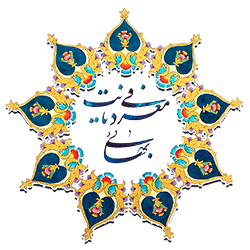بند صد و چهل و یکم
Thus Jesus, Son of Mary, whilst seated one day and speaking in the strain of the Holy Spirit, uttered words such as these: “O people! My food is the grass of the field, wherewith I satisfy my hunger.
بند صد و چهل و دوم
In like manner, it is related that on a certain day, one of the companions of Sádiq complained of his poverty before him. Whereupon, Sádiq, that immortal beauty, made reply: “Verily thou art rich, and hast drunk the draft of wealth.”
بند صد و چهل و سوم
This poverty and these riches, this abasement and glory, this dominion, power, and the like, upon which the eyes and hearts of these vain and foolish souls are set—all these things fade into utter nothingness in that Court! Even as He hath said: “O men! Ye are but paupers in need of God; but God is the Rich, the Self-Sufficing.” By “riches” therefore is meant independence of all else but God, and by “poverty” the lack of things that are of God.
بند صد و چهل و چهارم
Similarly, call thou to mind the day when the Jews, who had surrounded Jesus, Son of Mary, were pressing Him to confess His claim of being the Messiah and Prophet of God, so that they might declare Him an infidel and sentence Him to death.
بند صد و چهل و پنجم
It is also recorded in the Gospel according to St. Luke, that on a certain day Jesus passed by a Jew who was sick of the palsy, and lay upon a couch. When the Jew saw Him, he recognized Him, and cried out for His help.
بند صد و چهل و ششم
Thus with steadfast steps we may tread the Path of certitude, that perchance the breeze that bloweth from the meads of the good-pleasure of God may waft upon us the sweet savors of divine acceptance, and cause us, vanishing mortals that we are, to attain unto the Kingdom of everlasting glory. Then wilt thou comprehend the inner meaning of sovereignty and the like, spoken of in the traditions and scriptures.
بند صد و چهل و هفتم
When the Unseen, the Eternal, the divine Essence, caused the Daystar of Muhammad to rise above the horizon of knowledge, among the cavils which the Jewish divines raised against Him was that after Moses no Prophet should be sent of God.
بند صد و چهل و هشتم
Although the commentators of the Qur’án have related in divers manners the circumstances attending the revelation of this verse, yet thou shouldst endeavor to apprehend the purpose thereof.
بند صد و چهل و نهم
This people have repudiated all these verses, that unmistakably testify to the reality of “attainment unto the Divine Presence.” No theme hath been more emphatically asserted in the holy scriptures.
بند صد و پنجاه و یکم
And were they to say that by “divine Presence” is meant the “Secondary Revelation of God,” interpreted as the “Holy Outpouring,” this is admittedly applicable to the world of creation, that is, in the realm of the primal and original manifestation of God.
بند صد و پنجاه و دوم
This is the meaning of the “Day of Resurrection,” spoken of in all the scriptures, and announced unto all people. Reflect, can a more precious, a mightier, and more glorious day than this be conceived, so that man should willingly forego its grace, and deprive himself of its bounties, which like unto vernal showers are raining from the heaven of mercy upon all mankind?
بند صد و پنجاه و سوم
Strive, therefore, O my brother, to grasp the meaning of “Resurrection,” and cleanse thine ears from the idle sayings of these rejected people. Shouldst thou step into the realm of complete detachment, thou wilt readily testify that no day is mightier than this Day, and that no resurrection more awful than this Resurrection can ever be conceived.

